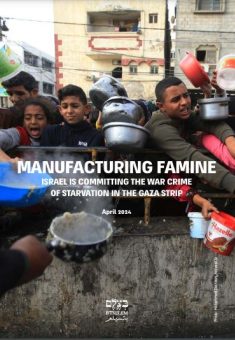Publications
Filter publications:
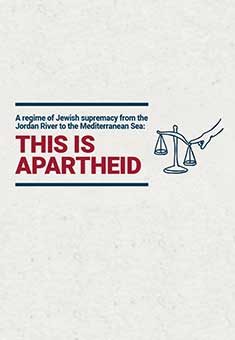
A regime of Jewish supremacy from the Jordan River to the Mediterranean Sea
This is apartheid
The entire area Israel controls between the Jordan River and the Mediterranean Sea is governed by a single regime working to advance and perpetuate the supremacy of one group over another. By geographically, demographically and physically engineering space, the regime enables Jews to live in a contiguous area with full rights, including self-determination, while Palestinians live in separate units and enjoy fewer rights. This qualifies as an apartheid regime, although Israel is commonly viewed as a democracy upholding a temporary occupation.
Playing the security card
Israeli Policy in Hebron as Means to Effect Forcible Transfer of Local Palestinians
The report demonstrates how Israel has been using security excuses to implement a policy that has made life unbearable for the Palestinian residents of Hebron’s city center (the Old City), in an effort to drive them from their homes. This policy relies on the extreme regime of separation Israel has been implementing in the city for the past 25 years – ever since the massacre of Palestinians carried out by Baruch Goldstein – so as to enable a small number of settlers to live in the heart of a crowded Palestinian city. This policy violates the prohibition against forcible transfer, which constitutes a war crime.
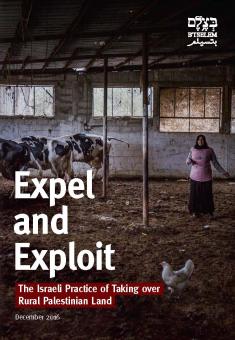
Expel and Exploit
The Israeli Practice of Taking over Rural Palestinian Land
The report B’Tselem published today shows how Israel has been taking over Palestinian rural space, fragmenting it, dispossessing its residents of land and water, and handing over these areas to settlers. The process is illustrated through a case study of three villages in the Nablus District - ‘Azmut, Deir al-Hatab and Salem - telling what these communities have undergone since Israel established the Elon Moreh settlement nearby. Through this case study, the report illustrates a broader policy Israel has been implementing throughout the West Bank for decades, and in which the settlers play a key role.
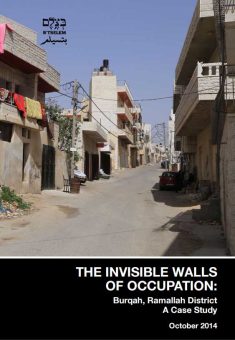
The Invisible Walls of Occupation
Burqah, Ramallah District, A Case Study
This report concerns the village of Burqah, Ramallah District. A rather unremarkable village, Burqah has never taken center stage in the fight against the occupation, and has not been subjected to extreme punitive measures. In fact, we chose to focus on Burqah precisely because it is unexceptional, as a case in point demonstrating what life under the occupation is like for residents of Palestinian villages. Burqah is a small, picturesque village, set amidst fields. Like many other villages, it endures severe travel restrictions which isolate it from its surroundings. It is also subject to massive land-grabs and stifled planning, all of which have turned it into a derelict, crowded and backward village with half its population living at or below the poverty line.
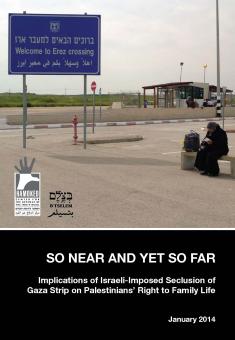
So Near and Yet So Far
Implications of Israeli-Imposed Seclusion of Gaza Strip on Palestinians’ Right to Family Life
Joint report with HaMoked, Center for the Defence of the Individual
The report explores Palestinians’ right to family life in view of Israel’s isolationist policy, which practically prohibits passage between Gaza and the West Bank, thereby severing families and keeping couples from living normally, if one spouse is from Gaza and the other from the West Bank. Tens of thousands face this impossible reality, whereby Israel intrudes on the most intimate aspects of life. Basic features of life–building a family, living with one’s spouse and children and regular contact with the extended family–become a pipedream.
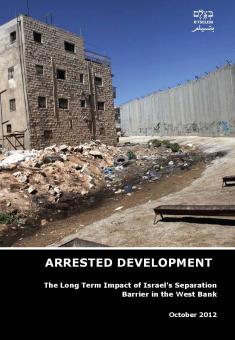
Arrested Development
The Long Term Impact of Israel's Separation Barrier in the West Bank
A decade after construction began on the Separation Barrier, the harm to adjacent Palestinian communities is clear. With some two-thirds of the barrier completed, it has crippled agriculture along its route. By isolating communities from each other and from their land, the barrier has eroded their ability to survive and prevents any sustainable development. This reality violates the state's commitment to the High Court that the barrier would not seriously harm these communities.
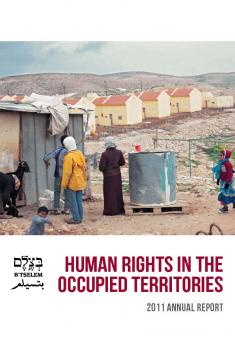
Human Rights in the Occupied Territories
B'Tselem 2011 annual report
The report surveys the broad spectrum of issues regarding the Israeli authorities' human rights record in the West Bank and Gaza Strip over the past year, the 44th year of the Israeli occupation. An interactive version of the report is available online and distributed through social media. The report documents a sharp increase in the number of uninvolved Palestinians killed by the Israeli security forces in the Gaza Strip in 2011. There was also an increase in the number of Israeli civilians killed by Palestinians, compared to 2010.
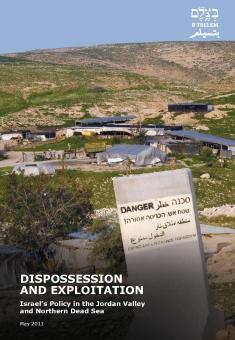
Dispossession and Exploitation
Israel's Policy in the Jordan Valley and Northern Dead Sea
Israel exploits the natural resources in the Jordan Valley more than in the rest of the West Bank and prevents Palestinians from using most of the area's land and water resources.
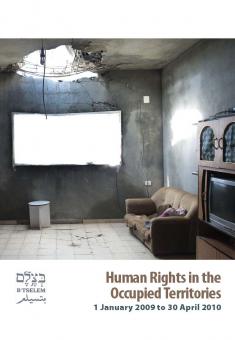
B'Tselem Human Rights Review
1 January 2009 to 30 April 2010
B'Tselem's annual report on human rights in the Occupied Territories, covering the 16-month period from January 2009 to April 2010. The report surveys the events since the beginning of Operation Cast Lead. One and a half years after the operation, the allegations regarding breaches of international humanitarian law by Israel and Hamas have yet to be properly investigated.
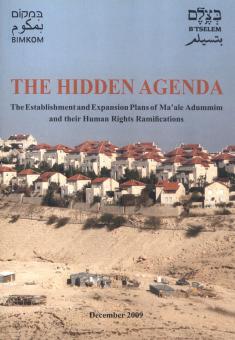
The Hidden Agenda
The Establishment and Expansion Plans of Ma'ale Adummim and their Human Rights Ramifications
The report reveals that as far back as the 1970s, Israel planned to annex Ma’ale Adummim. To do this, it expropriated over the years tens of thousands of dunams of Palestinian land and expelled hundreds of Beduin who were living there. Implementation of plans to expand the settlement will destroy north-south territorial contiguity in the West Bank and impede realization of the Palestinians’ right to self-determination.
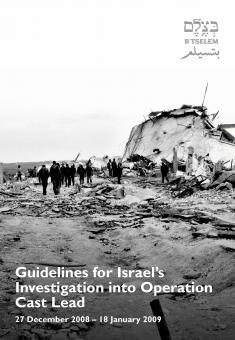
Guidelines for Israel's Investigation into Operation Cast Lead
B'Tselem issued a position paper detailing the guidelines of the necessary Israeli investigation of its conduct during the operation in Gaza. B'Tselem's initial survey of the military operation calls into question Israeli statements that the military acted according to International Humanitarian Law and that responsibility for the harm to the civilian population rests exclusively with Hamas.
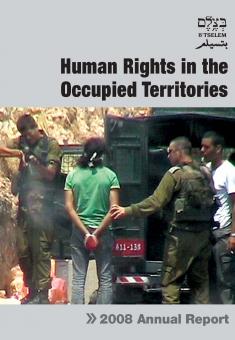
2008 Annual Report
Human Rights in the Occupied Territories
B'Tselem's annual report surveys a wide range of Israeli human rights violations in the OPT in 2008, until Operation Cast Lead. As house demolition and lack of law enforcement on violent settlers continued, Israel largely refrained from holding members of the security forces accountable for their actions.
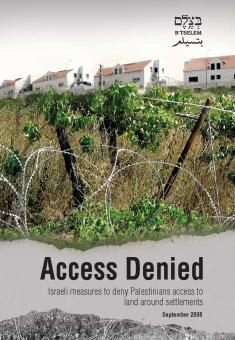
Access Denied
Israeli measures to deny Palestinians access to land around settlements
A report on Israel's blocking of Palestinian access to land around settlements lying east of the Separation Barrier. The report reveals that state authorities and settlers have de-facto annexed rings of land amounting to tens of thousands of dunams to these settlements.
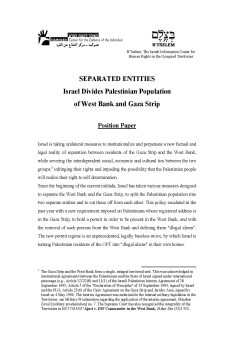
Separated Entities
Israel Divides Palestinian Population of West Bank and Gaza Strip
Israel is taking unilateral measures to institutionalize and perpetuate a new factual and legal reality of separation between residents of the Gaza Strip and the West Bank, while severing the interdependent social, economic and cultural ties between the two groups,1 infringing their rights and impeding the possibility that the Palestinian people will realize their right to self determination.
Israel’s regime of apartheid and occupation is inextricably bound up in human rights violations. B’Tselem strives to end this regime, as that is the only way forward to a future in which human rights, democracy, liberty and equality are ensured to all people, both Palestinian and Israeli, living between the Jordan River and the Mediterranean Sea.
